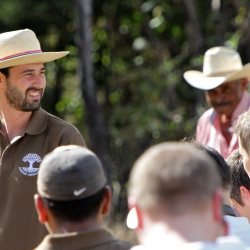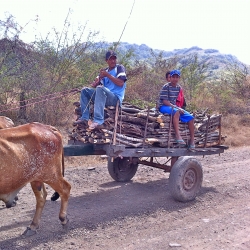Graduate Program: PhD
Supervisor: Dr. Gary Bull
Region of Interest: Nicaragua
Tags: BiometricsCarbon MarketsEconomic DevelopmentSmallholder ForestrySustainability
Research Summary

Forestry Investments in the Small Holder Context: Indicators of Viability
With rising energy prices and the emergence of carbon markets, I believe that there are major opportunities for smallholders in developing countries to use forestry as a tool for economic development. However, the establishment of forest plantations presents a number of challenges for smallholders, notably: cultural tradition, delayed return on investment, and their ability to market their forest products.
Using an interdisciplinary approach combining forest biometrics, land-use economics and social perceptions towards forestry, my doctoral research looks at the feasibility of using forest investment mechanisms combined with carbon finance to catalyze the establishment of forest plantations in partnership with smallholders. Unlike traditional financial forecasts, this research recognizes the variability of market conditions over the time horizon of a tree plantation. As such, in addition to bioeconomic analyses, a scenario analysis approach is taken where a multitude of goods and services can be produced depending on prevailing market conditions. The idea is to create an investment environment that provides smallholders with the technical expertise to engage in reforestation activities and a cash flow similar to traditional agriculture while providing an attractive return on investment for both beneficiaries and investors.
Why did you choose this region to conduct research?
In 2007, I cofounded Taking Root, a not for profit corporation that develops social reforestation projects in collaboration with smallholders in north-western Nicaragua. Its activities are funded through the sale of carbon offsets using the internationally recognized Plan Vivo standards. Over the years, we have been developing and managing forest plantations with hundreds of smallholder families. As the trees start to mature, the farmers involved are going to accumulate large volumes of fuelwood available from the first thinnings. We are now faced with the challenge of developing markets and transforming the wood as needed so that the farmers can get the best possible price for their products. In addition to providing well needed income to the farmers, these sales are needed to create the appropriate price signals to make forestry an economically competitive land-use option. This project thus provides the ideal case study for my PhD research.
What is the relevance of your research?

Over 50% of all wood harvested in the world is used as fuelwood, which accounts for a greater share of global energy demand than all other forms of renewable energy combined. Alarmingly, this consumption predominantly takes place in developing countries and is commonly unsustainable. This research thus helps link and address two critical global issues; poverty and the environment. The ultimate goal of this research is to develop the theoretical foundation for the creation of an inclusive investment fund that catalyzes large scale reforestation initiatives in partnership with smallholders. In addition to mitigating greenhouse gas emissions, such initiatives can help improve the lives of the poor by developing business strategies that utilize abundantly available local resources. Furthermore, such initiatives offer a long-term perspective while increasing smallholder’s resilience to climate change.